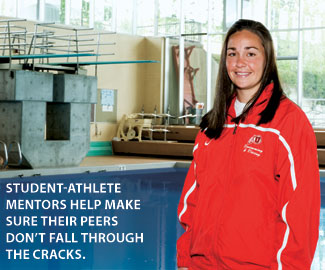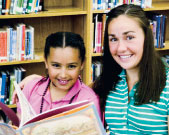
|
|
About Continuum Advertising Advisory Committee Archives Contact Us Continuum Home Faculty/Staff Subscribe related websites Alumni Association Marketing & Communications University of Utah Home |

SidelinesThe SAMs Club
by Jason Matthew Smith
Even the most casual sports fan can probably tell you a story or two about some college athlete featured on ESPN, in Sports Illustrated, or in The Salt Lake Tribune who has spectacularly self-destructed. Mainstream media love the story of the College Athlete Gone Bad, the lurid and cautionary tale of someone who blew it big time and embarrassed his or her school. There are numerous examples of this, from the serious (four Dixie State College athletes arrested in 2005 for aggravated robbery) to the bizarre (Cincinnati basketball player Art Long, arrested in 1995 for allegedly punching a police horse—four times). Far less common, however, are newspaper stories about the opposite kind of student-athlete, the one who is not only a talented and fierce competitor, but is also deeply engaged in his or her community, determined to put in extra hours over and above practice and training (to say nothing of classes and academics) to lend a hand to fellow athletes. These are the students who quietly pour everything they’ve got into their respective sports, get good grades, and commit themselves to giving back to the community through volunteer work. You don’t hear much from these students because they, by their very nature, are neither braggarts nor showboats. Yet their stories need telling, too. And you could say that the University’s Student-Athlete Mentors (SAMs) group is packed with such storylines. SAMs started in 1993 as a cooperative effort between the Athletics Department and the Campus Wellness Connection (a resource for information regarding mental and physical issues students face), ostensibly to make sure that student-athletes didn’t fall through the cracks—given the additional pressures of competing regularly—and end up in a career and academic freefall. Mary Bowman MEd’89, associate athletics director of student support services and a SAMs facilitator, says, “It started out as student mentors helping student-athletes make good choices when it came to substance abuse.” But what Bowman and others found was that athletes face a host of additional pressures, and the group evolved. Representing numerous sports, SAMs members serve as role models and peer helpers for other student-athletes, picking up tools such as listening skills and a basic understanding of emotional and psychological issues. “They’re not counselors,” Bowman says, “but sympathetic ears who have learned how to listen and help their peers.” But they’re also ambassadors of sorts, heading out into the community to lend a hand. Most SAMs members volunteer for various organizations, including the Special Olympics. During any given year, there are 15 to 18 student-athletes in SAMs, meeting a couple of times every month. One current participant is Marissa Martin, a senior Human Development major and swimmer. Martin holds the University record for 200-meter backstroke, and last season finished second in that category during the Mountain West Conference championships. She’s also one of eight student-athletes lauded by the Athletics Department for maintaining a 4.0 GPA. All of which would be more than enough to keep most students occupied. But Martin goes one step farther. Through her involvement with SAMs, she regularly devotes time to Big Brothers Big Sisters, which pairs volunteers with children for one-on-one mentoring. And for Martin, it’s no big deal to juggle classes, practice, and service work—she simply shrugs off the observation that she must be extraordinarily busy. “It’s just an hour of my time to help out an at-risk child,” she says. And she’s been doing that once a week for the past two years. Head swimming and diving coach Michael Litzinger doesn’t find it surprising that Martin has devoted herself to SAMs and volunteering. “That’s just one more piece of the puzzle that makes up Marissa,” he says. “She’s selfless.”
Like many of those in SAMs, Martin initially joined the group as a way to support and help her fellow athletes. With a father in the military, Martin had moved frequently around the country as she was growing up, living in Arizona, Hawaii, Texas (twice), Maryland, and Virginia—all before she’d even set foot on the U’s campus. “It wasn’t easy,” she says. But wherever she went, she found kinship with other swimmers, and because she was invariably the youngest in the group, the other athletes took her under their wings. At the outset, she viewed SAMs as a way to repay that debt, but soon found herself compelled to volunteer for Big Brothers Big Sisters. “I’m more willing to help people now, and to devote my time to getting out there in the community,” she says. “Before SAMs, I was so busy with school and swimming I put it off. But since being involved, it has opened my eyes.” She pauses for a moment, reflecting on her years of work with BBBS before adding, “It humbles you.” The community service component isn’t mandatory, but Bowman says that many of those in SAMs choose to become involved with at least one civic organization. “We usually have requests from different organizations wanting to hear the students come and speak,” she says, “and many do that. And some have done much, much more, like reading to children at elementary schools.” Starting in fall 2007, Martin will begin pursuing a master’s degree at the U’s College of Social Work. She plans to continue working in the community as much as possible. “The community has given so much to us,” Martin says of student-athletes. “It’s important to give back, and a little of my time goes a long way.” —Jason Matthew Smith is editor of Continuum. Men’s basketball coach Jim Boylen hits the ground running.by John YoungrenIt should be unbearable pressure: taking on the gigantic expectations that come with the 100-year tradition, winning history, and tremendous cachet of the University of Utah men’s basketball head coaching job. And yet? “I am jacked up,” says new U of U coach Jim Boylen, selected after a lengthy search by Utah Athletic Director Chris Hill MEd’74 PhD’82 in the weeks immediately following the end of a disappointing 11-19 overall (6-10 in the Mountain West Conference) season. “We’re going to get it done, and we’re going to have some fun.” And, just like that, a new era begins for U of U men’s basketball, embarking upon its 100th year following the forced resignation of head coach Ray Giacoletti. While he’s never held a head coaching job, the 42-year-old Boylen has impressive credentials, both in the college ranks (twice at Michigan State, which he left as the top assistant and with a 45-24 record in the past two seasons), and in the NBA, where he spent 11 years and was part of two championship teams for the Houston Rockets in the mid-’90s (he was also an assistant for Golden State and Milwaukee in the pros). “To be the best, you’ve got to be around the best,” Hill says. “Jim has done that at the college level, and he’s done that in the NBA.” Boylen, who most recently worked under Spartans head coach Tom Izzo at Michigan State, was given a five-year contract with the Utes worth some $575,000 per year. He inherits a maddeningly inconsistent, underachieving squad that is expected to return at least four starters and most of a roster that was filled with freshmen and sophomores in 2006-07. As the 14th men’s basketball coach in the U’s history, Boylen is expected to step in and quickly turn things around for a program that boasts a 1,595-833 record (10th overall in the NCAA) and a proud tradition. “This is a great basketball place,” Boylen says. “We’re going to start from today, and we’re going to try to build something. And it’s going to take all of [us] to do it.” —John Youngren BA’88 works in advertising for Love Communications in Salt Lake City. |

